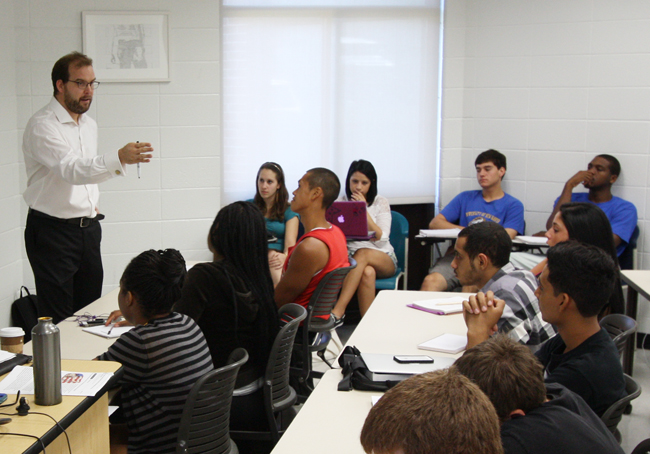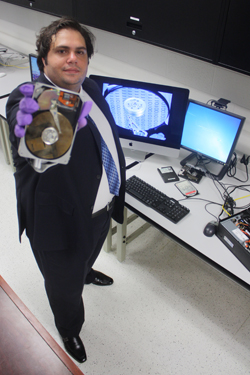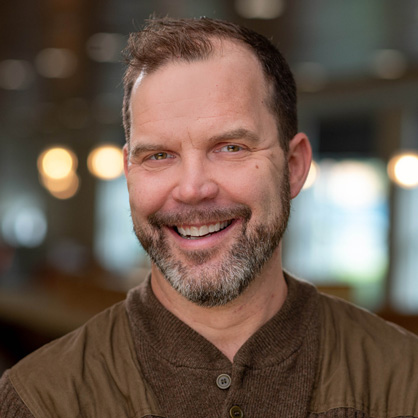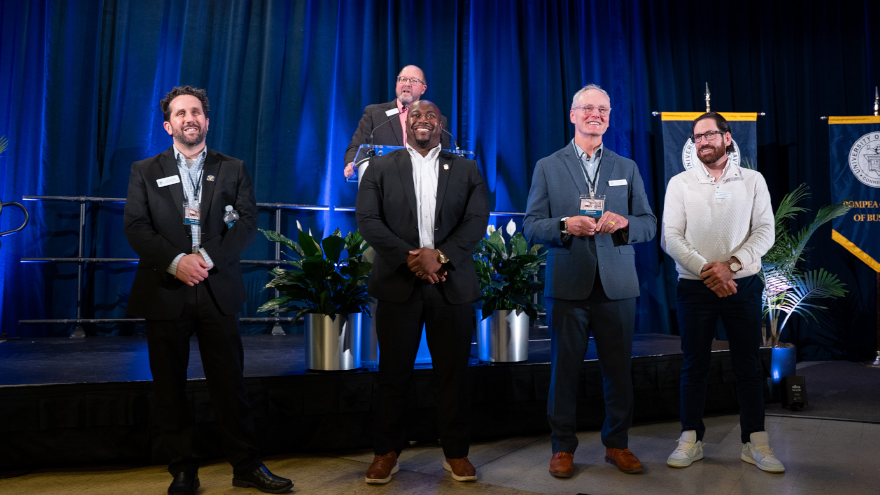
The Charger Blog
Charger Blogger Enters Final Semester with Excitement and a Plan
Beatrice Glaviano ’26 reflects on EMT life, learning assistant work, and what she hopes to carry into her final semester.
University News
September 11, 2013

Ibrahim (Abe) Baggili can reverse engineer a smartphone by piecing together the equivalent of millions of minute bits. His findings are used to corroborate evidence in law enforcement investigations.
Matthew Schmidt, an expert in planning complex military operations, was named to Fast Company magazine’s 2012 list of the 100 Most Creative Minds in Business.
The two national security experts joined the University of New Haven faculty this fall and will work across disciplines to further develop the University’s acclaimed national security program.
"They can function equally well in both the academic and practitioner's world. Their fresh perspective about arguably the two most important and compelling concerns for America, now and into the foreseeable future – digital crime and national security – are of the highest priority to them. UNH will benefit immensely from such scholarship." said William L. Tafoya, professor and director of the national security program.
"Professors Baggili and Schmidt represent the new wave of young scholars," said William L. Tafoya, professor and director of the national security program. "They can function equally well in both the academic and practitioner's world. Their fresh perspective about arguably the two most important and compelling concerns for America, now and into the foreseeable future – digital crime and national security – are of the highest priority to them. UNH will benefit immensely from such scholarship."
Baggili, assistant professor of computer science, is considered one of the top minds in the expanding field of cyber forensics. He is teaching Introduction to Computer Security and Introduction to Cyber Forensics and, together with faculty in computer science and criminal justice, he will develop curricula to establish a concentration in cyber forensics at UNH in the next year.
Interest in the field – which is evolving all the time – is exploding, and Baggili said there’s a great demand for talented cyber forensics experts in jobs with very high salaries.
Widely published in the field, Baggili has researched the effect of anonymity and integrity on cyber criminal engagement, iPhone use, cloud computing and e-mail forensics, and he has worked with law enforcement on the standardization of digital evidence and mobile device tool testing.

From Sept. 25-27, he will co-chair the Fifth International Conference on Digital Forensics and Cyber Crime in Moscow, a conference he hopes to one day hold at UNH.
Baggili is pursuing National Science Foundation funding so he and his students can create a psychological profile from an individual’s computer or smartphone. By using linguistics – a person’s choice of words in texts, emails and search words – he and his undergraduate and graduate students will develop the profiles that could be used in criminal investigations.
"He is a tiger by the tail that we have caught," said Ron Harichandran, dean of the Tagliatela College of Engineering. "He has very high energy with significant expertise in cyber forensics, an area that is in great demand by federal agencies in this country. He also is an entrepreneur with his own start-up company. These are characteristics we value highly."
Harichandran said he is excited about the collaborative possibilities between the Tagliatela College of Engineering and the Henry C. Lee College of Criminal Justice and Forensic Sciences that will develop with Baggili’s hiring.
Baggili said he was drawn to UNH because of the entrepreneurial spirit of the administration and faculty and its reputation in forensic science. "I liked the Dean, the department head and the faculty," he said. "UNH is a small university with a big impact and it’s on the upward trajectory. I want to inspire my students to do leading-edge research to take the field further and help them develop the mindset for conducting criminal investigations."
Schmidt taught military operations planning and political science at the U.S. Army's School of Advanced Military Studies (SAMS) AT Fort Leavenworth, Kansas, where his students were lieutenant colonels and majors, the staff officers for generals and colonels.
While Schmidt has no military experience himself, he offers outside-the-box thinking and a Ph.D. in government from Georgetown University, where he founded the "Matters Military" blog for the Georgetown Journal of International Affairs.

His insights were inspired by his background with studio classes in theater and by construction projects in Kansas City that he passed by on his way to work. Populous, the architectural firm that designed London’s Olympic Stadium, was developing a soccer stadium there.
As the building went up, he started to see a possible link between the conceptual planning in military operations and the planning used to develop and build the sports complex. The building was being designed on the basis of a single image: the beauty of the arc of a ball in the air and bodies in motion as they ran toward it.
Schmidt was interested in the process that had led to this kind of clarity in planning and if it could be used in crafting war strategy. One of the chief lessons he learned was that the architects collaborated with the construction engineers from the start, when there wasn’t even an initial design, something that even in architecture was unusual.
"They got all the stakeholders involved early on and developed this trust," Schmidt said.
Together, the architects and construction engineers mapped out a visual plan. The building was completed six months early and won numerous awards.
Schmidt and his military students sat in on discussions between the architects and construction engineers, and the staff officers immediately saw the connection. "You’re here in Afghanistan," said Schmidt. You’ve got to figure out a plan to handle the firefights over here, build a justice system there and deal with civilian and military leaders, Afghan policymakers and NATO allies, all in one room. It’s a lot like what architects do to develop a single vision with clients, engineers and zoning boards."
He said there was a lot military leaders could learn about building trust and the tools designers used to create visualizations that depict the interconnections in a building project.
Developing such strategic thinkers will be a big part of his focus at UNH. He came because experiential learning is central to the UNH experience and central to what good strategic thinkers do. After guest lecturing in a class in which he found the students to be intellectually curious and talking at length with Tafoya, he knew he wanted to teach here.
Schmidt, who is teaching American Government and Politics, will work with Tafoya to develop courses in the area of military planning. Widely published, Schmidt is currently finishing a book tentatively titled The Habit of Strategy: Developing Strategic Leaders for Business and Government that is due out next spring.

The Charger Blog
Beatrice Glaviano ’26 reflects on EMT life, learning assistant work, and what she hopes to carry into her final semester.

The Charger Blog
Katelyn Beach ’25, ’26 MBA reflects on her hands-in collaboration with the program’s founder and how Uccountability’s goal-setting and peer-based model can shape student growth, leadership development, and community at the University of New Haven.

University News
New University-wide council will advance strategic partnerships, immersive student opportunities, and innovative research, supporting the University’s strategic plan the development of its pioneering Center for Innovation and Applied Technology.